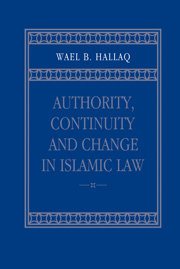Book contents
- Frontmatter
- Contents
- Preface
- 1 Juristic typologies: a framework for enquiry
- 2 Early ijtihād and the later construction of authority
- 3 The rise and augmentation of school authority
- 4 Taqlīd: authority, hermeneutics, and function
- 5 Operative terminology and the dynamics of legal doctrine
- 6 The jurisconsult, the author–jurist, and legal change
- Summary and conclusions
- Bibliography
- Index
Summary and conclusions
Published online by Cambridge University Press: 27 July 2009
- Frontmatter
- Contents
- Preface
- 1 Juristic typologies: a framework for enquiry
- 2 Early ijtihād and the later construction of authority
- 3 The rise and augmentation of school authority
- 4 Taqlīd: authority, hermeneutics, and function
- 5 Operative terminology and the dynamics of legal doctrine
- 6 The jurisconsult, the author–jurist, and legal change
- Summary and conclusions
- Bibliography
- Index
Summary
The formation of the legal schools by the middle of the fourth/tenth century was achieved through the construction of a juristic doctrine clothed in the authority of the founding imam, the so-called absolute mujtahid. Juristic discourse and hermeneutics were the product of this foundational authority which was made to create a set of positive principles that came to define the school not so much as a personal entity of professional membership, but mainly as an interpretive doctrine to be studied, mastered, and, above all, defended and applied. Juristic authority, therefore, was to be sustained throughout the successive stages of legal history, each stage passing on its authoritative legacy to the next. But the transmission of authority in juristic typologies was progressively restrictive, reflecting not a growing rigidity in the law but rather the evolution of a relatively more determinate body of positive law. The perception of hierarchical ranking, in which the interpretive possibilities were, in diachronic terms, increasingly restricted, was thus a function of stability and determinacy, not of incompetence or unquestioning taqlīd. The hallmark of juristic excellence was not so much innovation as the ability to determine the authoritative school doctrine. This recognition of juristic competence in justifying and promoting continuity and thus stability, predictability, and determinacy was discursively attributed to the lower ranks of the juristic hierarchy, not because of a lower demand on the intellectual abilities of the jurist, but because justifying the tradition was an activity marked by insistence on the epistemic authority of the past, both recent and remote.
- Type
- Chapter
- Information
- Authority, Continuity and Change in Islamic Law , pp. 236 - 241Publisher: Cambridge University PressPrint publication year: 2001



